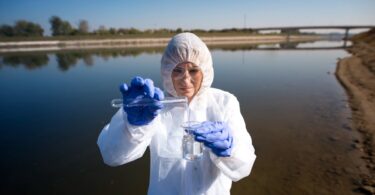If you are interested in pursuing a career in environmental health, you may wonder what kind of courses and certifications you need to get started. Environmental health is a broad field that covers various aspects of protecting human health and the environment from harmful agents and hazards. Environmental health professionals work in various settings, such as government agencies, industries, consulting firms, research institutions, and non-governmental organizations.
This article will provide you with some of the best environmental health courses and certifications you can obtain in 2023. These courses and certifications will help you gain the knowledge, skills, and credentials in demand in environmental health. Whether you are a beginner or an experienced practitioner, you will find something that suits your needs and interests.
Table of Contents
Best Environmental Health Courses
One of the best ways to learn about environmental health is to enroll in online courses that cover various topics and issues related to this field. Online courses offer flexibility, convenience, and affordability for learners who want to enhance their knowledge and skills at their own pace and schedule. Here are some of the best environmental health courses that you can take in 2023:
1. Impacts of the Environment on Global Public Health
This specialization offered by the University of Michigan consists of four courses that explore how environmental factors affect global public health. You will learn about environmental hazards’ sources, pathways, and effects, such as air pollution, water contamination, climate change, and infectious diseases. You will also learn about the strategies and interventions to prevent or mitigate these impacts. This specialization is suitable for beginners who want a comprehensive environmental health overview.
2. Global Environmental Management
This course offered by the Technical University of Denmark (DTU) introduces you to environmental management and sustainability concepts and principles. You will learn about the environmental challenges and opportunities that face different sectors and regions of the world. You will also learn about the tools and methods that can help you assess, monitor, and improve environmental performance. This course is best for intermediate learners who want to develop their environmental management skills.
3. Essentials of Global Health
This course offered by Yale University provides you with a broad introduction to global health. You will learn about the determinants, indicators, and health and disease trends across countries and regions. You will also learn about the major actors, institutions, and initiatives that shape global health policy and practice. You will also learn about the ethical and social issues in global health. This course is suitable for mixed-level learners who want to gain a global perspective on health.
4. Sustainable Tourism – Promoting Environmental Public Health
This course offered by the University of Copenhagen examines how tourism can contribute to environmental public health. You will learn about the impacts of tourism on natural resources, ecosystems, biodiversity, and human health. You will also learn about the principles and practices of sustainable tourism that can minimize negative impacts and maximize positive benefits for tourists and host communities. This course is suitable for beginners who want to learn about the linkages between tourism and environmental public health.
If you find article useful, don't miss out on the valuable insights and information available in our other related posts:
Best Environmental Health Certifications
Another way to boost your career prospects in environmental health is to obtain professional certifications that demonstrate your competency and credibility in this field. Recognized organizations award professional certifications after you meet certain eligibility criteria and pass an exam or assessment. Here are some of the best environmental health certifications that you can obtain in 2023:
1. Certification in Public Health (CPH)
The National Board of Public Health Examiners (NBPHE) offers this certification and is considered the standard credential for public health professionals. To be eligible for this certification, you need to have a graduate degree from an accredited school or program of public health or a bachelor’s degree plus five years of public health experience. You must also pass a 200-question exam covering various domains of public health knowledge and skills.
2. Occupational Health and Safety Technologist (OHST)
The Institute of Hazardous Materials Management (IHMM) offers this certification and is designed for practitioners who implement occupational health and safety programs. To be eligible for this certification, you must have an associate degree or higher in any field, a high school diploma, and two years of relevant experience. You must also pass a 200-question exam covering various occupational health and safety topics.
3. Board Certified Environmental Engineer – Industrial Hygiene (BCEE)
This certification is offered by the American Academy of Environmental Engineers and Scientists (AAEES) and is intended for engineers who specialize in industrial hygiene. To be eligible for this certification, you need to have a bachelor’s degree or higher in engineering from an accredited program plus eight years of relevant experience. You also need to pass an oral exam that evaluates your technical knowledge and professional judgment.
4. Safety Management Specialist (SMS)
The Board of Certified Safety Professionals (BCSP) offers this certification and is aimed at experienced safety practitioners who manage, develop, and implement safety programs. To be eligible for this certification, you must have a bachelor’s degree or higher in any field plus five years of relevant experience, an associate degree or higher in safety, health, or the environment, plus seven years of relevant experience. You also need to pass a 200-question exam covering various safety management aspects.
5. Certified Environmental Systems Manager (CESM)
The National Registry of Environmental Professionals (NREP) offers this certification and is designed for professionals who manage environmental systems and programs. To be eligible for this certification, you need to have a bachelor’s degree or higher in any field plus four years of relevant experience or an associate degree or higher in environmental science or engineering plus six years of relevant experience. You also need to pass a 100-question exam covering various environmental systems management topics.
The Bottom Line
Environmental health is a rewarding and challenging career that requires continuous learning and improvement. By taking online courses and obtaining professional certifications, you can enhance your knowledge and skills and increase your employability and credibility in this field. We hope this article has given you useful information and guidance on the best environmental health courses and certifications you can obtain in 2023.





